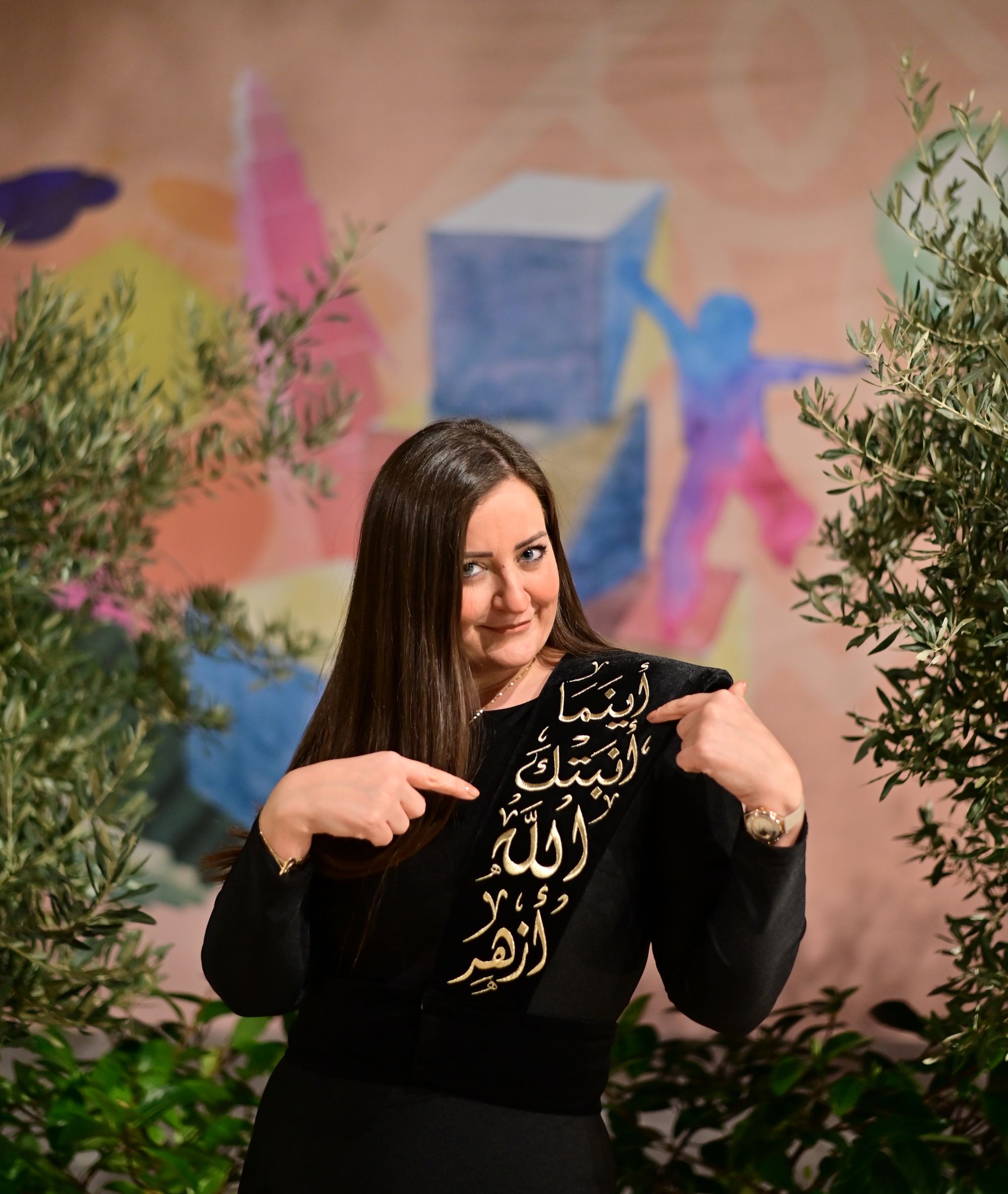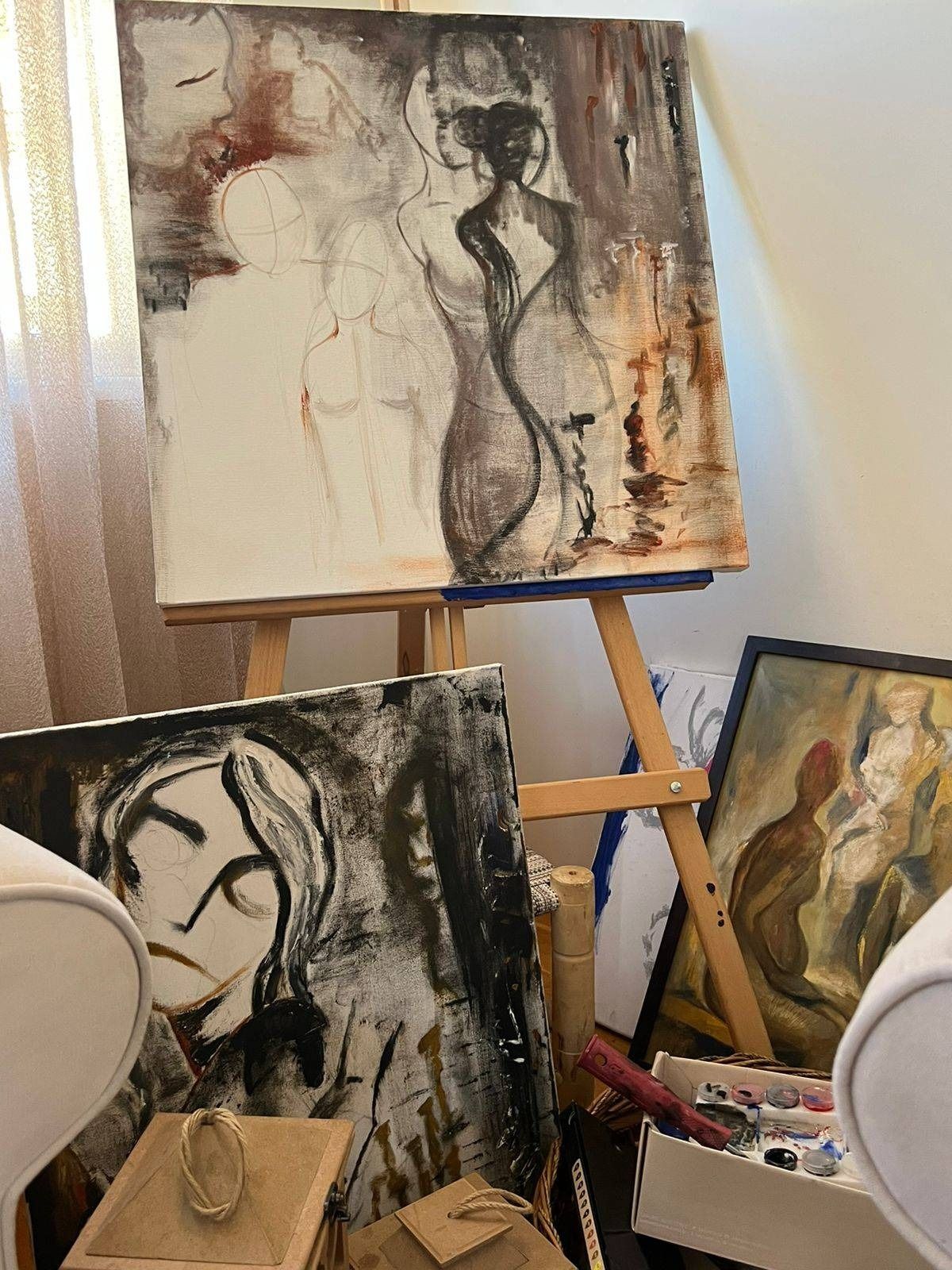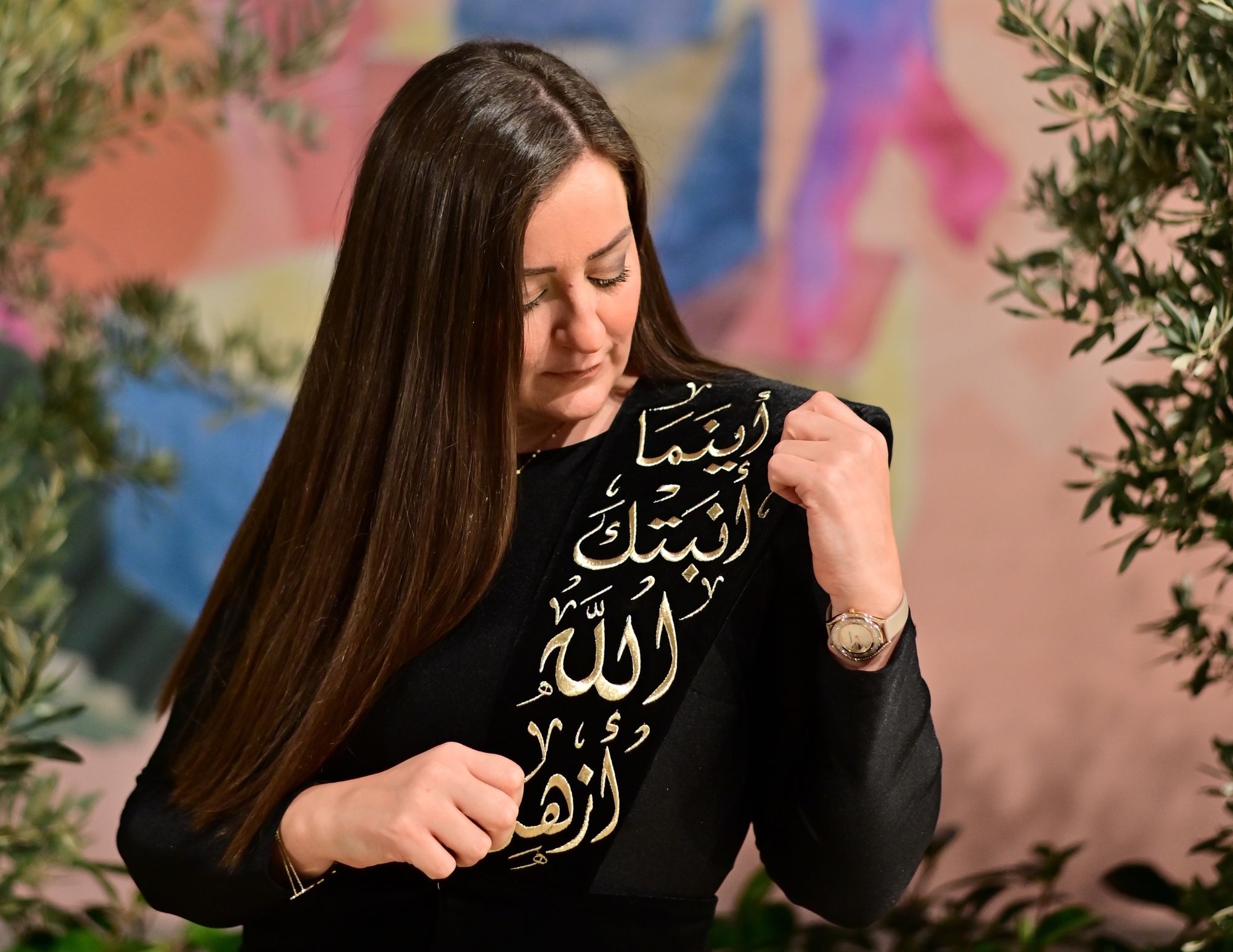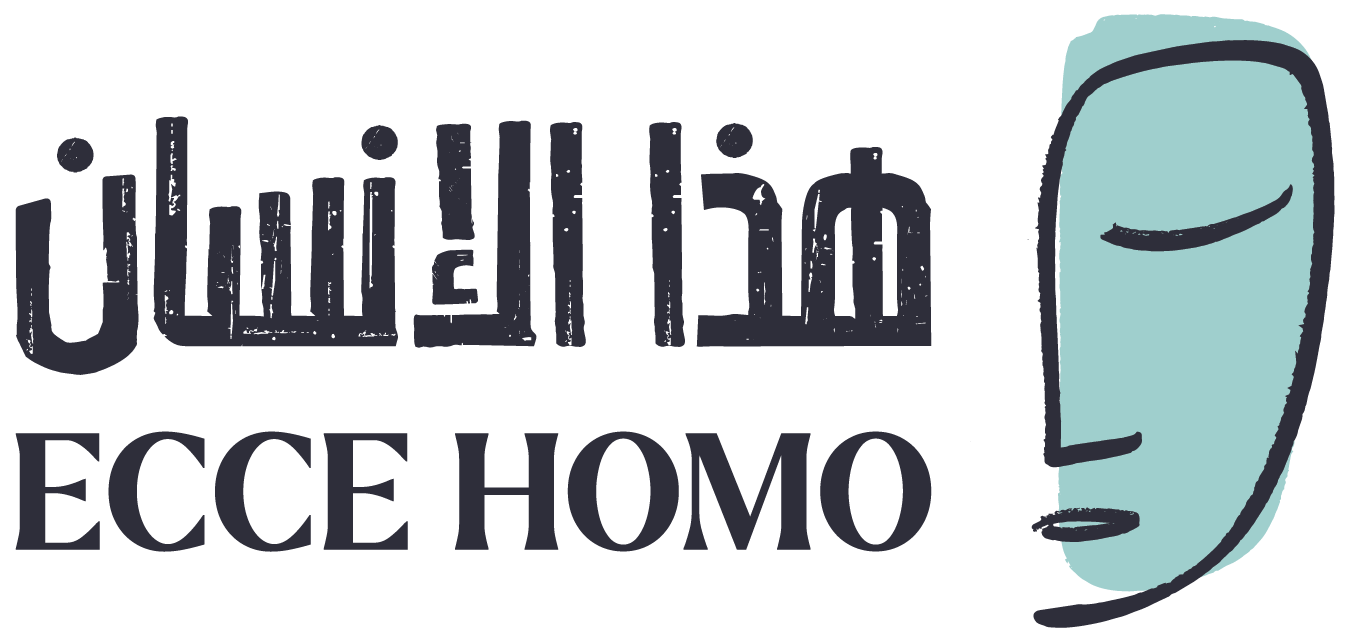
In Aleppo, Gaziantep, and the Oscar’s, Reem, a Syrian Woman, Blooms Wherever she Goes
In weary Aleppo, which was undergoing many transformations at the time, the heroine of our story was born. In 1987, two engineers, who had their own firm, welcomed their third-born, a new sibling to their boy and girl. From the very young age of 5, it seemed that the family’s “artistic genes” were deeply rooted in her. In fact, her maternal grandfather was a visual artist from Al-Mayadin, a town in Eastern Syria. He loved art since he was a child and asked his father, a farmer, to send him to Italy to pursue his artistic studies, which was considered unorthodox back then. However, he was able to follow his dream. He completed his education in Italy and returned back to Aleppo, where he settled down with his wife. There, he held many exhibitions, founded the Fine Arts Center, and was its first director.
Reem’s talent was the main focus of her mother’s attention. She nurtured her, enrolled her in necessary classes, and provided her with the required tools and painting material. Her interest in art developed during her adolescent years, where she spent a significant time of her only day off on Fridays, in the company of her grandfather and his colleagues to learn from them different forms of art as well as various methods, including but not limited to: pencil drawing, aquarelle, and oil painting – which was her favorite. She had a tendency towards abstract art that presents clear characters, situations, events, and messages despite the absence of personal features. She still practices it to this day in a corner of her house, which she turned into a small painting studio.

The young woman thought of moving to Damascus, where her uncle lived, to study at the College of Fine Arts there – a decision which was not particularly well-received by her parents due to her young age. However, they were aware that no other option was available. At that moment, destiny intervened to open an unexpected door, with the establishment of the College of Fine Arts in Aleppo. She immediately enrolled in 2006 and became a member of the first graduating class there.
Due to an emergency amendment to admission conditions, Reem had to enroll in a parallel programme, in the same college affiliated with the public university. However, this programme was paid and its fees were relatively high, even though the three first-ranked students were rewarded with a full scholarship. Reem’s father had only one condition: If she were able to place among the first three top students, then the fees he was going to pay become hers. This was, in fact, the case as the young artist did not disappoint.
She completed her first year at university, where she took general courses as an introduction to specializations that students usually encounter in subsequent years. She was then met with a similar dilemma to the one she was facing a year earlier: which specialization will she choose? Design, sculpting, advertising, or photography? Each of the choices had its pros and cons. However, fate intervened again when a new specialization in fashion design, which was not even available at the college in Damascus at the time, opened in Aleppo. It seemed like a magical solution to the conflict that the young student was facing.
Reem devoted herself fervently to studying. She was encouraged by a Russian teaching assistant who gave her all to students and taught the course with an enormous amount of passion, leaving by that a lasting impression on her pupils. In 2010, the young artist presented her graduation project on fashion of the “first ladies” inspired by the depths of the sea. She came up with hand-drawn and colored fabrics in marine colors like water blue and coral red. She still remembers the moment, 12 years later, when one of the jury members asked to “take a picture with [her] before she became famous, to remember [her] by.” Reem recalls her graduation, describing it as “one of the most beautiful moments where she felt a sense of accomplishment and achievement with the recognition from those around [her].”
She still remembers the moment, 12 years later, when one of the jury members asked to “take a picture with [her] before she became famous, to remember [her] by.” Reem recalls her graduation, describing it as “one of the most beautiful moments where she felt a sense of accomplishment and achievement with the recognition from those around [her].”
Following that, she took another important step when she married her partner and spent a few calm months before a new page in Syrian history started in 2011, when the revolution against the Syrian regime broke out. The mere fact that she and her husband expressed their opinion was enough reason for them to receive threatening messages. However, this did not stop them from participating in demonstrations and partaking in emergency work related to providing medicines to the wounded who were shot by security forces during protests. Nevertheless, in 2012, various combined factors pushed the small family into a transitional step.
Their family home was close to the headquarters of a well-known security branch, which was a center for targeting neighborhoods outside of the Syrian regime’s control. Bombing sounds which shook the house day and night, the arrest of Reem’s husband for a day because of his activism, as well as the birth of their newborn daughter, were all factors which prompted their decision: to move to Gaziantep in Turkey, on the other side of the border. Despite the fact that their area was relatively safe, the general atmosphere and increasing threats pushed them towards taking that decision. They thought that they would leave for “a few weeks until things calmed down, and then [they] can return”, as was the recurring narrative among thousands of Syrian families who did not realize that their planned trip would not be short. This was a long journey where return could barely be seen on the horizon.
Despite the fact that their area was relatively safe, the general atmosphere and increasing threats pushed them towards taking that decision. They thought that they would leave for “a few weeks until things calmed down, and then [they] can return”, as was the recurring narrative among thousands of Syrian families who did not realize that their planned trip would not be short. This was a long journey where return could barely be seen on the horizon.
On the day of their scheduled departure from Aleppo, they woke up to the sound of a terrifying explosion. The house was filled with dust, and the kitchen was barely standing. It took them a few minutes to realize that their house was not targeted, but that it was the effect of heavy shelling coming out from nearby security headquarters! This accident postponed the trip for a day and confirmed their feelings that it was the right decision to make at the time.
In Gaziantep, Reem, who was accustomed to work, could not stay idle. Therefore, she volunteered in a number of Syrian associations and organizations, where she offered her design services and worked remotely as often as she could. Four months passed, and by the beginning of 2013, there was talk about returning to Aleppo. However, on January 15th, around 1:00 p.m., Reem was on the phone with her mother back home who was on her way to visit a relative. They ended the call, and the young woman went to perform her daily prayers. As soon as she finished, she received news that the Faculty of Architecture at the University of Aleppo was bombed.
“I immediately felt that it was over. I know that my family’s house is near the college, and so was my mother’s destination. I did not need any further confirmation.” She attempted to call her mother several times but to no avail, until her brother confirmed news of her death straight from the University’s hospital morgue. A shrapnel penetrated the car door and hit her directly in the heart. Even though someone tried to help her on scene, she did not make it.
This was a day that many people in Aleppo will never forget. Hundreds of people watched as the regime’s planes bombed a faculty filled with students and professors. Officials claimed that it was an accident, and many misleading stories were published to distort the truth. More than 80 people died, in addition to hundreds of others who were wounded. It was the most difficult day in Reem’s life.
She immediately took the decision to go to Aleppo, despite the risk of her arrest and the challenges of the journey. She made it just in time to the funeral, which was delayed until her arrival. Security men, dressed as if they were going to battle – armed with their weapons and other military supplies – from the most notorious security branch arrived to pay their condolences! Reem, who was pregnant with her second baby at the time, received many threatening messages and was a target for harassment. She stayed in Aleppo for 13 days, before leaving it for good. She has not set foot there since then.
The next two years were psychologically difficult for the young woman because of her mother’s sudden death, pregnancy, childbirth, news of death and oppression back home, as well as other challenging circumstances. She forced herself to volunteer, seeking to relief some of the pressure; therefore, she worked with various Syrian and international organizations. Years later, she realized that she has reached a point where she felt that her life was stable, and that she still could make use of her university degree. Based on her needs as a mother, she launched a daycare for children of working mothers, which was equipped with an innovative system that allowed parents to follow their child’s activities through cameras that kept them updated through a feed transmitted via internet.
This project contributed to filling an existing gap and securing job opportunities for young Syrian women. They assumed the role of caretakers and were supervised by Reem. However, due to her interest in other projects, she closed it down after four years, when she took the initiative to move to something else. She was a partner in a local café with two other people – one Syrian and one Turkish, before launching “Dentelle”, a company licensed to organize parties, events, and conferences and secure all of its requirements and logistics. Her work was not only limited to Gaziantep as she was able to extend her company’s services to other Turkish cities such as Mersin and even Istanbul.
She recalled her memories in Aleppo, where she used to design oriental Abayas, hand-embroidered with Arabic letters that she was extremely fond of. Back then, they gained unexpected popularity to the point where she was sending orders to Denmark and Belgium. Yet, she did realize that competition in Gaziantep is really high, especially in a city so developed in the fields of clothing and textile production. Despite all of that, she designed and manufactured few pieces that would allow her to participate in foreign fashion exhibitions, without considering to move forward with a serious commercial project.
In 2020, Reem’s friend, Waad Al-Khatib, director of the movie “For Sama”, who was residing in Britain called her and said: “Our film is about to be nominated for an Oscar. I want you to design a suitable dress for me to wear at the Awards. You have 12 days only!”
She started drawing “sketches" of initial designs, keeping in mind that “[they] wanted a design with a message written in Arabic.” She paid attention to the smallest details; even the color of the embroidery was inspired by the “Bougainvillea”, a plant that was in the garden of Waad’s house in Aleppo. She also made sure that the color of the fabric perfectly matched the director’s skin tone. Reem mobilized all of her relationships in Gaziantep to complete her mission, from initial tailoring to embroidery. She was in a race with time, having fittings online without even taking any of Waad’s measurements!
Reem succeeded in completing this impossible mission. The dress was shipped form Gaziantep to Istanbul, and then Britain, to finally reach the United States, just a day before the Oscars. Waad did not believe the beauty of the dress, which was not given its due in the pictures that she previously received from Reem. It required few alterations, which were completed by a local tailor near the hotel. The young designer stayed up all night waiting for the Oscar’s live coverage to see her friend in the dress, embellished with the following chosen sentence: “We dared to dream, and we will not regret our dignity.”
Unfortunately, the film did not win the Oscars, but the dress caught the eye of many and conveyed the needed message. Reem did not believe the hype and publicity that the dress and its designer gathered on social media, radio, and television, “I could not have imagined even 1% of what actually happened.”
If you noticed the embroidery on @waadalkateab’s dress, you’ll be interested to know that it’s an Arabic poem that translates as “we dared to dream and we will not regret dignity” #oscars #redcarpet #redcarpetfashion #oscars2020 #waadalkateab #forsama pic.twitter.com/XzLPaZbgUF
— For Sama (@forsamafilm) February 9, 2020
Today, the young woman is producing Syrian designs using famous Turkish fabrics, integrating the culture of the two countries. She is cooperating with Turkish designers, craftsmen, tailors, and workshop owners to reach her goals.
Far from the negative effects of refugee waves on labor markets and the economy, which appear on the short-term but leave long-standing consequences, many Syrians in Turkey currently provide a positive lever for the Turkish economy. Between 2011 and 2020, more than 10,000 licensed Syrian companies were established in Turkey, which secured a number of job opportunities for refugees and citizens like. In addition, until the end of 2017, there were 4,793 Syrian companies in Turkey with a joint capital of nearly 40 million Euros. Last but not least, the exports of Syrian businessmen/women in Gaziantep, during 2021, amounted to 500 million dollars, which constitutes 10% of the city’s exports.

Reem stresses the importance of cooperating with experienced Turkish citizens, who complement the experiences of Syrians, to reach a successful partnership that benefits both parties. In fact, she is trying to do so through several projects, including the café and others related to her passion for fashion design. Despite the many challenges that she experienced and the difficulties that left permanent marks in her life, Reem is a living representation of what she shares about Syrians everywhere, “They all work as hard as they can to prove themselves and to avoid being dependent on anyone”. She also keeps in mind a piece of advice that her mother shared, days before she passed, when Reem was both tired and desperate. This sentence is now embroidered on an elegant black dress: “Wherever God makes you grow, don’t forget to bloom.”
Reem is a living representation of what she shares about Syrians everywhere, “They all work as hard as they can to prove themselves and to avoid being dependent on anyone”. She also keeps in mind a piece of advice that her mother shared, days before she passed, when Reem was both tired and desperate. This sentence is now embroidered on an elegant black dress: “Wherever God makes you grow, don’t forget to bloom.”
